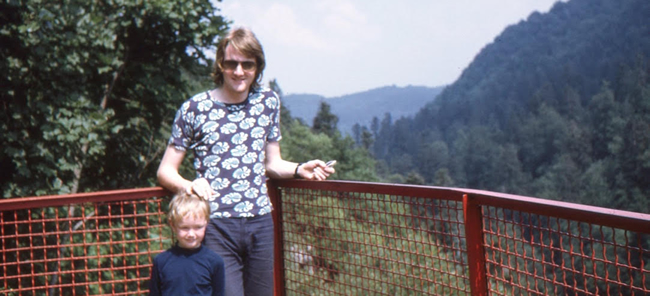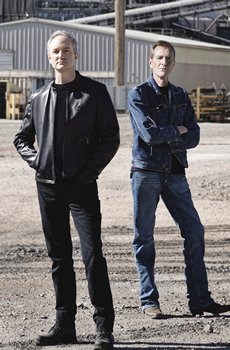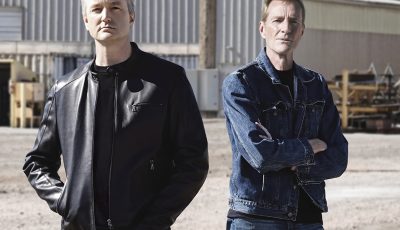

Up Close: Lee Child and Andrew Child
Handing Over the Torch
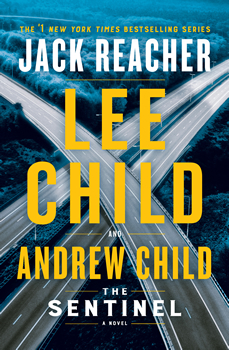 By Rick Pullen
By Rick Pullen
Before the end of chapter two of THE SENTINEL—the latest Jack Reacher novel—our hero has been outnumbered in two fights, and the body count is rising.
You know it’s coming. It always does. But Lee Child is so good at satisfying that visceral urge in his readers to fight injustice in the world, it still feels fresh after 24 novels in the series.
Face it: nobody does it like Lee Child.
Or do they?
THE SENTINEL marks a sea change in the most popular series in the crime/thriller genre. Child, who has sold more than 100 million books and has just turned 66, has decided to retire, buy a new couch, kick back, and read books for the rest of his life.
No kidding. That’s the plan.
And despite his name being emblazoned in larger type across the novel’s cover than either the title or his co-author, his younger brother Andrew Grant, it was Grant who actually wrote it. Child had some input, but acknowledges he really had little to do with it.
Grant, who will use the pseudonym “Andrew Child” for the series, has come close to capturing his brother’s voice, which is a 180-degree turn from where he wanted to be more than a decade ago. “When I started out writing,” Grant says, “I spent all my time trying not to sound like Lee Child.”
Grant has a singular advantage in taking over the series: he’s been immersed in his brother’s writing since before Child’s first novel was published in 1997. He was reading and studying his brother’s manuscripts long before Jack Reacher’s fans got the chance.
Even though Grant is 15 years younger than his more famous brother, having grown up in the same household in England, they share the same familial history and sibling shorthand. Child left home when his brother was young so Grant grew up with his parents and another older brother in the house.
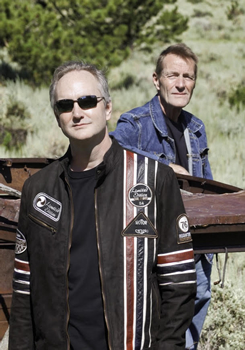
This photo of the brothers, taken by Andrew’s wife, was captured not far from their houses in Wyoming.
Because of their age difference, Child says, “We didn’t have any sibling bullshit, which colors the rest of your life. We didn’t have that…It’s much more of a friend thing than a brother thing—and we’re very similar.”
And that’s a good thing because in THE SENTINEL, it’s difficult to tell where Child ends and Grant begins. That’s exactly what Child’s publisher, Delacorte Press, wants.
This isn’t the first time a major thriller series has passed the torch to a new writer, although usually it’s a result of its creator filling an urn or gravesite somewhere. Famously, publishers have worked deals with the likes of the estates of Ian Fleming, Robert Ludlum, Tom Clancy, and Stieg Larsson to continue their legacies, with great financial success. But in this case, of course, Child is still very much alive—much to his liking.
He cites the early death of Larsson from a heart attack as to why he chose this handoff to his brother. It took Larsson’s publisher three years to deal with his estate and bring back the legacy of the author of the Girl with the Dragon Tattoo. That’s a long time in the publishing business.
“We wanted to make it invisible,” Child says. “My guess is some of the audience is not even going to notice. They don’t give a thought about the author. Why should they?” (His publisher may have other ideas. Compare the type size of Child’s name on the cover of THE SENTINEL to the novel’s title.)
“The idea is to reassure the readers,” Child says. “The ultimate success for me is that the character lives on.”
Child has been thinking about a transition for several years and when he finally decided to ask his brother, he had reservations. “When I asked him, ‘Would you consider this crazy scheme?’ I felt bad because he would have to put his other stuff on hold.”
“I was caught off guard,” Grant says. “I was hit by a whole range of thoughts all at once. It was such an honor he would ask me. Then I thought, ‘Could I do it?’”
At the time, Grant had just finished the second book in a trilogy about Paul McGrath, a fictional former intelligence agent. Grant is a huge fan of the Aston Villa Football Club in Aston, Birmingham, in England and named his protagonist after the real McGrath, one of its most famous players from Ireland.
In all, Grant has written nine thrillers—a standalone, two trilogies, and two in his yet unfinished trilogy. His publisher, Ballantine Books, agreed to delay publication of his last book for a year so he could transition into the Jack Reacher series and keep it on track for its annual October release.
Grant admits he’s never done two novels in a year, so this next year will be a challenge to complete his trilogy and the next Reacher novel.
While the contract for Jack Reacher calls for a four-book collaboration between the siblings, Lee acknowledges THE SENTINEL is really his brother’s work.
“It rarely works when you collaborate line-by-line to write a book…It can happen but it must be incredibility difficult,” Child says. “It was his plot. A lot of the action was his. I was ready to comment, and I did all the time…I felt Andrew should run with it and I would not interfere…There was surprisingly little talk before.”
His brother, Child says, is the perfect person to take over the series. “We’ve got 25 years of collaboration behind us already.”
Child jokes that he has one other reservation about passing the torch. “Suppose he does it better than I do?”
Well, that could be embarrassing. Or would it? Readers will decide soon.
Child says one reason he’s retiring from his series is because he struggles to identify with a younger audience. Reacher has always been somewhat of a luddite in a changing world, always kicking and screaming (well, he doesn’t actually scream) into the 21st century.
“I’m rapidly getting out of date,” Child says, “and Reacher has always been behind the curve with technology.”
That begins to change under Grant’s tutelage—THE SENTINEL is all about technology. One of Grant’s goals is to pull Reacher into a more modern world. The new novel is also ripped from today’s headlines. “It’s kind of spooky when you see stuff you’re writing about appearing in newspapers,” Grant says.
Child says the timing is right for him. “I had made myself a promise based on reading other people’s series…that I would never phone it in, and I never have. I cannot keep this up forever.”
So what does he plan to do next? A new series? The occasional blockbuster?
“I want to be retired, so I don’t want to write anything… I’m going to buy a real comfortable sofa and I’m just going to read for the rest of my life. I was born in Europe. I have no work ethic. So I plan on reading other people’s books.”
He’s a voracious reader, devouring a book a day. And he doesn’t throw them away when he’s done, but keeps them in one of his four homes in Wyoming, Colorado, New York, or London. That’s a lot of shelf space.
Child does have other interests, though. “I’m an extremely poor guitarist, and I may try to get better.” And he says he might try getting serious about woodworking.
His fans need not fear they will never see him again. He’ll still drop in at writers’ conferences. “I’m going to be like the old retired uncle. I’ll show up.”
It’s not like he’s falling off the face of the earth either. He recently served as a judge for the Booker Prize. Through July of this year, he read all 162 entries.
Child also has responsibilities with Amazon, which is producing a new Jack Reacher streaming series. He is executive producer and has more control over it than he did the two Reacher movies produced by Tom Cruise.
The first season of the series is written, but the pandemic has slowed production. Child had hoped the production company could have been quarantined in Georgia, where it was originally scheduled to shoot. But the pandemic outbreak became so severe in Georgia that Amazon moved production to Canada and will begin shooting in the spring. He hopes it airs on time next fall.
Child is actually returning to his roots with Amazon. It’s no stretch for him since he started his career at the BBC as a presentation director, writer, and traffic manager.
Ironically, when Child started the Reacher novel series, it was Grant who was making money. “When he started out I was the one with a secure job and a pension,” Grant says. “The boot was almost on the other foot.” At the time, Child was struggling financially, having been fired from the British Broadcasting Corporation for ruffling management’s feathers in his role as shop steward.
Grant didn’t set out to be a writer, although he initially majored in English at the University of Sheffield. He quickly found, “I hated English literature.” But he couldn’t change majors easily. To do that he would have had to drop out of college. Instead, he double majored in English lit and drama.
After graduation, he and five friends set up their own theater company, which soon became a financial failure. Grant admits they were self-indulgent and performed only their original material. An unknown theater company doing unknown material didn’t stand much of a chance.
“I was broke so I thought I’d get a regular job and get out of debt.” He flunked the civil service exam, or so he thought, and soon received a mysterious letter for a meeting in London. “They tried to recruit him for MI-6,” Child says. “He could have been the next James Bond. Instead he’s writing him.”
After turning down the spy business, Grant found a job in British telecommunications. He stayed there for 15 years while his brother became a novelist. During this time Grant read a novel and hated the ending. “It formed an itch I had to scratch.” So he decided to quit his job and set out on his brother’s path to become an author. He received a buyout—enough to live on for a year—and began writing.
While attending the 2008 Bouchercon in Baltimore, he met American novelist Tasha Alexander. They married and moved to Chicago. Alexander writes the Lady Emily historical suspense series about the adventures of Lady Emily and her husband Colin Hargreaves. It’s set around the turn of the 20th century in Great Britain and Europe.
Ironically, Alexander, the American, writes British fiction, and Grant, the Brit, is now writing American fiction. How does a native of Great Britain write believable American characters and plots and capture the culture?
His wife, who is from Indiana, helps him, he says, but he also grew up watching American television shows, which are prevalent in England and give Brits a window into US culture. “It’s actually easier to observe things about a country through the eyes of an outsider,” Grant says.
“American culture does not take great pains to conceal itself,” Child adds.
In 2016 Andrew and Tasha decided to take a road trip, which included Laramie, Wyoming, where she had lived for a year. They liked it so much they decided to move there permanently in 2017. “We were looking for a larger place at the time, having somewhat outgrown our apartment, and as soon as I encountered the space and peace of Wyoming I said to her, why don’t we move here? I was in love with the scenery and solitude the moment I experienced it.”
They settled in the foothills of Wyoming’s Medicine Bow Mountains, not far from Laramie, where they enjoy spectacular views from their porch 8,600 feet above sea level looking over a nature preserve. Child liked it so much when he visited that he bought a house three and a half miles away. There is one house between them, and it’s 10 miles to the nearest paved road. Four-wheel drive pickups are a must.
It is there that Grant began writing his first Jack Reacher novel, and it’s still taken some degree of thought and study even though he’s been immersed in the character for two and a half decades.
“I remember [the first novel], Killing Floor, so clearly…I know this character, I know what he does. I know what makes him tick.”
“The thing I really had to try hard at was the style,” he says. “It can’t be orchestrated. The style of the book is so important.”
He also says fans must experience the effect of the final product—something they don’t necessarily see in the words. “It’s like viewing the façade of a beautiful building. You have no idea of its infrastructure underneath… A richer book doesn’t work if it’s not written properly.”
Child always wrote Reacher novels organically, not always knowing where the story would end. “What it boils down to is you can’t tell Jack Reacher what to do. It’s a complete waste of time,” Grant says. “If you’re going to write without an outline or a plan, then you have to have confidence in what you’re writing…That’s reflected in the self-confidence of the character.”
And as any reader of Jack Reacher knows, he is not deficient in that department.
So why does Child have a fight scene early in every novel? “In real life,” Child explains, “we all live with frustrations we have no control over…It’s just this frustrating injustice that doesn’t get worked out. That’s why people read books…Including a fight scene is tremendously cathartic and consoling to the reader.”
He says he includes the scene early in each novel “so it explains the character…It becomes kind of a talisman.”
THE SENTINEL starts off like most Jack Reacher novels, but then you begin to feel the nudge to a more modern character as the plot unfolds. Technology plays a huge role in the plot when Reacher hitches a ride with an insurance adjuster to Pleasantville, a small town in Tennessee, an hour outside of Nashville.
Reacher spots an obvious kidnapping setup in broad daylight and intervenes as only he can. He saves an unassuming tech guy, Rusty Rutherford, who is persona non grata in the town for allowing ransomware hackers to shut down the Pleasantville government computers. Rusty claims it wasn’t his fault. Reacher believes him and decides to help, only to quickly realize he’s stumbled onto a huge conspiracy with national consequences. And while Reacher is still Reacher, we discover a hint of vulnerability late in the novel.
The plot is true Jack Reacher, but Grant’s writing in his first Reacher outing is not as tight and sparse as his brother’s. No doubt that will evolve over time as he takes the character to new places.
Child is grateful for his brother’s willingness to take over the series. “It was a big ask,” he says, “and it worked out better than I had hoped. This is one of those rare instances where a real harebrained idea actually might work.”
Initial reviews say he just might be right.
“The reaction so far is slightly bittersweet for me,” says Child. Which is probably a good sign. It’s like sending a child off to college for the first time. Your angst, happiness, and loss of control are all rolled into one big sigh of relief as you recognize what was once your baby is now off on a new adventure.
Not only is his brother faithfully recreating his protagonist, but Lee’s baby, Jack Reacher, will live on long after Child is happily picking away at a guitar, producing an Amazon series, and figuring out what in the world this woodworking stuff is all about.
- On the Cover: Richard North Patterson - May 31, 2023
- On the Cover: Robert Dugoni - March 31, 2023
- Up Close: Tammy Euliano - December 30, 2022

